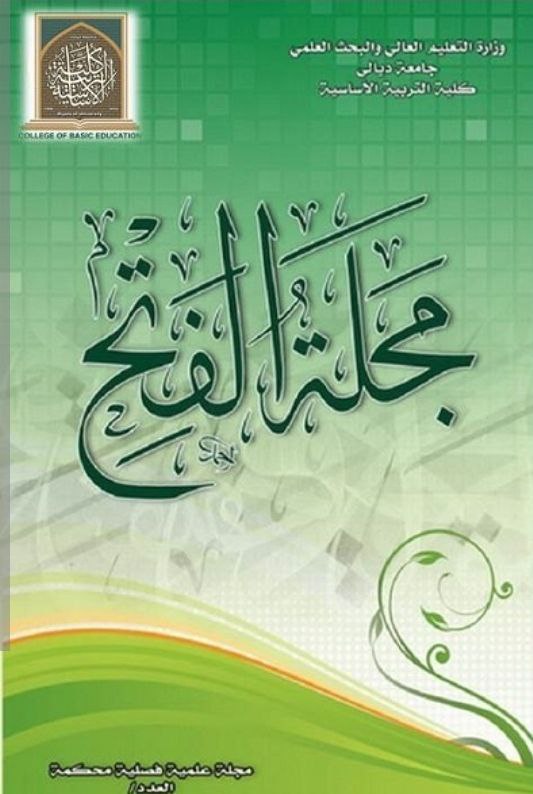A Relevance-Theoretic Analysis of Implicature in Arthur Miller's Death of a Salesman
DOI:
https://doi.org/10.23813/fa/16/55Keywords:
Relevance Theory, Implicature, Implicated Premise, Strong/Weak ImplicatureAbstract
Abstract :
Relevance theory (henceforth RT) is one of the modern pragmatic theories which combines both pragmatics and cognition. It tackles the pragmatic phenomena differently from other theories. One of these phenomena is implicature. The focus of this study is to discuss the idea of implicature from RT's perspective, using relevance-theoretic comprehension procedure as a model adapted from Moeschler (2007) version of Wilson and Sperber's (2004) model of comprehension procedure to analyze implicature in Arthur miller's Death of a Salesman
This paper is divided into two parts; the first is the theoretical discussion of RT and a detailed explanation of implicature and its kinds, and the second is the analysis of Arthur miller's Death of a Salesman according to RT's model. The analysis begins with presenting the selected text, then the context, lastly the derivation of implicature.
References
Bibliography
Allot, N. (2013)"Relevance Theory".In Capone,A., Lo Piparo, F.andCarapezza,M.(eds.). Perspectives on Linguistic Pragmatics. Pp, 57-99.Switzerland: Springerinter-national Publishing.
Bataller, S. (2002) Reformulation and Relevance Theory of Pragmatics: The Case of T.V News Interviews. Valencia: University of Valencia.
Barzinji, M. (2012) The Image of Modern Man in T.S.Eliot's Poetry. Bloomington: Author House.
Carston, R. and Hall, A. (2012) "Implicature and Explicature". InSchmid, Hans-Jorg (ed.). Cognitive Pragmatics. Pp 47-80. Berlin: Walter de Gruyter.
Clark, B. (2013) Relevance Theory. New York: Cambridge University Press.
Grundy, P. (2000) Doing Pragmatics. New York: Oxford University Press.
Haugh, M. (2002) "The Intuitive Basis of Implicature: Relevance Theoretic Implicitness Versus Gricean Implying". International Pragmatic Association. Pp: 117-134.Retrieved from http://www98.griffith.edu.au/.
Haugh, M. (2015) Im/politeness Implicatures. Berlin: Walter De Gruyter.
Huang, Y. (2012) The Oxford Dictionary of Pragmatics. United Kingdom: Oxford University Press.
Ibanez, F. and Hernandez, L. (2003) "Cognitive Operations and Pragmatic Implication". In Panther, Klaus-Uwe and Thornburg, Linda L. (eds.). Metonymy and Pragmatic Inferencing. Pp 23-51. Amsterdam: John Benjamins Publishing.
Ingram , J. (2007) Neurolinguistics: An Introduction to Spoken Language Processing and its Disorders. Cambridge: Cambridge University Press.
Jodlowiec, M. (2008) "What's in the Punchline?" In Wałaszewsk E. , Kisielewska-Krysiuk, M. , Korzeniowska, A. and Grzegorzewska, M. (eds.). Relevant Worlds: Current Perspectives on Language, Translation and Relevance Theory. Pp 67-85. Newcastle: Cambridge Scholars publishing.
Kreb, C. (2010) "An Analysis of Comprehension Problems Based on Discourse Analysis and Relevance Theory". M.A thesis. Available from GrinVerlaghttp://www.grin.com.
Recanati, F. (2004) Literal Meaning. Cambridge: Cambridge University Press.
Rouchota, V. and Jucker, A. (eds.). (1998) Current Issues in Relevance Theory. Amsterdam: John Benjamins Publishing Company.
Shaer, B. (2013) "Toward a Cognitive Science of Legal Interpretation". In Freeman, Michael and Smith , Fiona (eds.). Law and Language: Current Legal Issues. Pp, 259-292. United Kingdom: Oxford University Press.
Sperber, D. and Wilson, D. (1995) Relevance: Communication and Cognition. 2nd ed. Oxford: Blackwell.
Walaszewska, E. and Piskorska, A. (eds.). (2012) Relevance Theory: More than Understanding. United Kingdom: Cambridge University Press.
Wilson , D. and Sperber, D. (2004) " Relevance Theory". In Horn, Laurance and Ward, Gergory (eds.). The Handbook of Pragmatics. Pp, 607-633 . Malden, USA: Blackwell Publishing.
Downloads
Published
How to Cite
Issue
Section
License
Copyright (c) 2016 مجلة الفتح

This work is licensed under a Creative Commons Attribution 4.0 International License.
حقوق النشر والترخيص
تطبق مجلة الفتح للبحوث التربوية والنفسية ترخيص CC BY (ترخيص Creative Commons Attribution 4.0 International). يسمح هذا الترخيص للمؤلفين بالاحتفاظ بملكية حقوق الطبع والنشر لأوراقهم. لكن هذا الترخيص يسمح لأي مستخدم بتنزيل المقالة وطباعتها واستخراجها وإعادة استخدامها وأرشفتها وتوزيعها ، طالما تم منح الائتمان المناسب للمؤلفين ومصدر العمل. يضمن الترخيص أن المقالة ستكون متاحة على نطاق واسع بقدر الإمكان وأن المقالة يمكن تضمينها في أي أرشيف علمي.
لمزيد من المعلومات، يرجى متابعة الرابط: https://creativecommons.org/licenses/by/4.0/.



